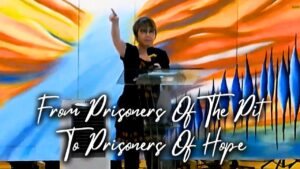Scripture Reading: Exodus 3:6-7; 15-16
Moreover he said, I am the God of thy father, the God of Abraham, the God of Isaac, and the God of Jacob. And Moses hid his face; for he was afraid to look upon God. And the Lord said, I have surely seen the affliction of my people which are in Egypt, and have heard their cry by reason of their taskmasters; for I know their sorrows;
And God said moreover unto Moses, Thus shalt thou say unto the children of Israel, the Lord God of your fathers, the God of Abraham, the God of Isaac, and the God of Jacob, hath sent me unto you: this is my name for ever, and this is my memorial unto all generations. Go, and gather the elders of Israel together, and say unto them, The Lord God of your fathers, the God of Abraham, of Isaac, and of Jacob, appeared unto me, saying, I have surely visited you, and seen that which is done to you in Egypt:
When God set up to secure a people, wholly delivered from bondage and separated unto himself, he appears to Moses at the burning bush and in a remarkable way identifies himself by a threefold designation ‘I am the God of Abraham, the God of Isaac and the God of Jacob.’ And when a little later God sends Moses to the Israelites to announce His intention to them, the same three fold expression comes through His pronouncement; ‘Thus shall thou say unto the children of Israel, The Lord, the God of your fathers, the God of Abraham, the God of Isaac, and the God of Jacob, hath sent me unto you: this is my name forever, and this is my memorial unto all generations.’
If you know the Bible well enough, you will notice that Abraham, Isaac and Jacob occupy a special place in the holy word. We hear this phrase repeated so often throughout the Old Testament as well as the New Testament. At times, even in our prayer, with understanding or without understanding, during moments of intense needs we open our prayer by calling upon the God of Abraham, Isaac and Jacob. I did that. It is interesting to note that God said, ‘I am the God of Abraham, the God of Isaac, and the God of Jacob. Likewise, the Lord Jesus quoted it in the New Testament. ‘I am the God of Abraham, and the God of Isaac, and the God of Jacob. This is found in Gospel of Matthew, Mark, and Luke. Jesus said, we would see ‘Abraham, and Isaac and Jacob in the kingdom of God and many will recline at the table with Abraham, Isaac and Jacob in the Kingdom of heaven.’
Why the triple refrain? Why does God name Himself in such a way? What is the significance in the mind of God that He wants us, who read His holy word, to think of these three men? The Apostle Paul assures us that what is contained in scripture was written for our learning. Indeed the fact that God identifies Himself in association with these particular three men, there are some significances that can give us instruction and encouragement. The Old Testament is full of “types” and “principles” that illustrate God’s eternal truths that we need to learn. What are these principles concerning the threefold designation?
1. God selects a group of people to come under His name and to make them his people
With Abraham, God began a people. God had a spiritual beginning with Abraham. He did something in Abraham; giving him particular experiences. I do not know about you. But God has a spiritual beginning with me. All of God’s people have to go through the same kind of experiences. Similarly he did some work in Jacob, giving him particular experiences and through him God conveyed these experiences to all of God’s people. The dealings with these three; Abraham, Isaac and Jacob, and the experiences they went through culminated in the people of God. They can only be considered the people of God when they go through the experiences of Abraham, Isaac and Jacob. You can only be measured a child of God if you go through the occurrences of Abraham, Isaac and Jacob. It is not enough to make us God’s people if we merely have Abraham’s experience. It is not enough to make us God’s people if we merely have Isaac experience. It is not enough to make us God’s people if we merely have Jacob’s experience. We must have the attainments of Abraham, plus Isaac, plus Jacob before we can grow to be God’s people.
Each of these men occupies a particular position before God. Their different spiritual experiences typify three different kinds of spiritual principles. All true Israelites and all genuine people of God must say that Abraham, Isaac, and Jacob are their ancestors. To say that Abraham is our ancestor is not enough, because Ishmael and his descendants can also say that their ancestor is Abraham. Today all Muslim recognize Abraham as their father but that is no enough. Neither is it enough to say that both Abraham and Isaac are our ancestors, because Esau and his descendents can say the same thing. God’s people must say that their ancestors are Abraham, Isaac, and Jacob. Jacob must be included for complete qualification. All three must be together before we can justifiably be a people of God. 2000 years year God selects the Church to come under His name and to make them His people. Individually is still selecting someone to come under His name and to make he or she God’s people.
2. The Life of Abraham is the principle of the Heavenly Father
Abraham’s original name was Abram. Later God changed his name to Abraham. Within both of these two names is the root Abra, which in the original language means “father.” Interestingly his wife’s name is also changed from Sarai to Sarah. This is done for both by adding the letter h or hey in Hebrew to their names. In Hebrew each of the alpha-beta letters has significant meaning. The sages believed that the meaning of the letter ‘hey’ is divine presence or spirit filled. So he changes their names by filing them with His presence. By adding hey or filling them with his divine presence, the names means “highly exalted Father’ or ‘Heavenly Father.
Abraham was a father himself, and the lesson he learned was to know God as the Father, highly exalted Father or Heavenly Father. Throughout his whole life, he learned this one lesson—knowing God as the Father. When Jesus taught us prayer, he started off with ‘Our Father in Heaven.’ Repeatedly Jesus, the Son of God always addresses and call upon His God as ‘My Father.’ There are many who believes in God but few address him as ‘My Father.’
What does it mean to know God as the Father? It means that everything is from God. God is the unique initiator or originator of all that matters in life. That is how you become the child of God. The Lord Jesus said, “My Father is working until now, and I also am working” (John 5:17). He did not say, “My God is working until now,” but “My Father is working until now.” For God to be the Father means that God is the Creator, the unique Initiator. The Son was sent from the Father. “The Son can do nothing from Himself except what He sees the Father doing, for whatever that One does, these things the Son also does in like manner” (v. 19). This must be our experience. We must receive grace from God to realize that we cannot initiate anything. We are not worthy of initiating anything. Genesis 1 begins by saying, “In the beginning God…” In the beginning it was not us, but God. God is the Father, and everything originates from Him. I observe my life. God initiates my salvation. We don’t initiate our own salvation. Joy’s best friend was very impressed by the beauty of Joy’s wedding. She too wanted to have a Christian wedding. So she attends to church hoping that one day she will have a Christian wedding. She thought she is already a Christian by attending church and wanted to take communion. Joy has to advise her against it. Well, her dream came to pass. She did have a Christian wedding. But is she really a child of God. I mean she works for a cigarette company as a laboratory researcher. It seems that she initiates her own salvation. Many Japanese in the 1980s and 1990s and now even the Chinese from China wants to have a Christian wedding. So they just go to a church and ask for a Christian wedding. Do they really know God? Is God their father? I don’t think so. Who initiates your salvation? God initiates my calling as a missionary to the Philippines. I started working as a government civil servant upon graduation. I say to myself, that I will work for a few years to pay back my mum for the 20 years she has spent on me raising me up. I knew that she needed my money during those times. Then the God of Abraham , The God of Isaac and the God of Jacob says, ‘Don’t say there are yet four months then cometh harvest; look unto the field; they are white unto harvest. God the Father initiates my calling. Honestly my first daughter Joy was not planned by us. I take it to mean God initiates her birth. Pastor Lily and I were adjusting because we were just married less than a year. There was a lot of squabbling and infighting. Then Joy came. She became the buffer. Our attention was shifted to that lovely, tiny white little baby. God forced us to move to this land because we couldn’t afford to pay the rent at Quezon Street. God forced us to be independent because he has something different from what my ex boss what us to be. God initiates our Cambodia Missions. Whatever that is initiated by God has His hand on it and there is a special blessings that accompanies it. Is God the initiator of your experience in life? It was definitely so with Abraham.
The day that God shows you that He is the Father will be a blessed day. On that day you will realize that you cannot do anything and that you are helpless. You will not have to try to hold yourself back from doing this thing or that thing. Instead you will ask, “Has God initiated this?” This is the experience of Abraham. His experience shows us that he had no thought of becoming God’s people. Abraham did not initiate anything. It was God who initiated. It was God who brought him from the other side of the Euphrates River (Gen. 12:1-5). God wanted him, and He called him out. Abraham never thought of this. Hallelujah! God wanted him and God did the work.
God is the Father. Abraham did not volunteer to go to the land flowing with milk and honey. God said it first, and then Abraham went and possessed it. He did not know anything about it beforehand. When he was called to go out, he did not know where he was going (Heb. 11:8). He left his father’s land without knowing where he was going. This was Abraham. God was the Initiator of everything for him; he had nothing to do with it. If you know that God is the Father, you will not be so confident and will not say that you can do whatever you want. You will only say, “If the Lord is willing, I will do this and that. Whatever the Lord says, I will do.” This does not mean that you should be indecisive. It means that you truly do not know what to do and that you only know after the Father has revealed His will.
This was not all. Abraham did not know that he was going to beget a son. He even had to receive his son from God. Abraham could not initiate anything. His son was given to him by God. Abraham knew God as the Father. This kind of knowledge is not a knowledge in doctrine. It is a knowledge brought about by experience and in which one is brought to the point of confessing, “God, I am not the source. You are the source of everything, and You are my source. Without You, I cannot have a beginning.” Let me ask you? Where is your source of your salvation? Where is the source of your success? Where is your source of whatever you are doing? Is your heavenly father’s hand in it? This was Abraham. If we do not have Abraham’s realization, we cannot be God’s people. The first lesson we have to learn is to realize that we can do nothing and that everything depends on God. He is the Father, and He is the Initiator of everything. We can say that Abraham knew God as God the Father.
3. The Life of Isaac is the principle of heirship
The principle of heirship is commonly known as the principle of sonship. What is the lesson we learn from Isaac? Galatians 4 says that Isaac is the promised son (v. 23). In Isaac we see that everything comes from the Father. The history of Abraham, Isaac, and Jacob in Genesis 11 through 50 shows us that Isaac was an ordinary and unexceptional man. I do not know about you. But I remember that when I was a young Christian, I often wonder why God calls himself the God of Isaac when Isaac was unspectacular and actually did very little to deserve that position that God has given him. That is the truth that God wants to bring forward. He has everything because He is the heir. He was not like Abraham, and he was not like Jacob. Abraham came from the other side of the great river; he was a pioneer. Isaac was not like this. But neither was Isaac like Jacob, whose life was filled with difficulties and who suffered many dealings. Isaac’s whole life was an enjoyment of his father’s inheritance. It is true that Isaac dug a few wells. But even the wells were first dug by his father. “And Isaac digged again the wells of water, which they had digged in the days of Abraham his father; for the Philistines had stopped them after the death of Abraham: and he called their names after the names by which his father had called them” (Gen. 26:18). The lesson that Isaac teaches us is we are heir of God and joint heir with Christ. There is nothing that we have that not been received. Paul asked a question: “And what do you have that you did not receive?” (1 Cor. 4:7). Isaac receives everything because he is the heir.
What is the status of an heir? By virtue Isaac, being the heir of Abraham, he has all the inheritances of Abraham. By virtue of our position in Christ, we benefits from all the accomplished facts of Jesus’ history; His life on earth, His death and resurrection, and his ascension at God’s right hand. All His work becomes ours, all that He has done is covered by the statement, ‘It is finished.’ By virtue of the fact that Christ is in us, we become partakers of His life. All His powers, all that He can do now, all that He is today, becomes ours. Both these aspects of our union with Him are included in our inheritance. All the gifts already are given to us to provide for our lives, our future, our standing before God, and our practical holiness – everything. Two years ago, God spoke very clearly that He is my possession, He is my inheritance. To be very honest, I wasn’t very impressed with God he says. I mean I want tangible inheritance, I want tangible possession. How about giving me some lands, some houses, a large congregation. I was so foolish and I want to apologize to God today. I begin to understand the second principle. The life of Isaac is the principle of Inheritance. If I have God, and I am the heir, I have everything.
A pastor gave this illustration. He says, ‘I have a bus ticket here, and I put it into the pages of this book. Now I put the book into the fire and burn it. What happens to the ticket? Or I throw the book into the river, what about the ticket? Or again, I wrap the book into a parcel and take it to the Post Office and mail it to Europe. Where is the ticket now? You can answer each question with absolute assurance. Once it was in the book, I did nothing more with the ticket. I did not send the ticket to Europe; I sent the book. Because the ticket is in the book, where the book goes the ticket must go. It has a part in everything that happens to the book. We are in Christ. Christ is that book. Whatever happens to the book happens to us. And Christ has conquered all and given us everything.
This is Isaac. You are Jesus’ heir. Can you lose the heirship when you are truly a child of God? A pastor tells about a new convert who came in deep distress to see him. ‘No matter how much I pray, no matter how hard I try, I simply cannot seem to be faithful to my Lord. I think I’m losing my salvation.’ The Pastor said, ‘Do you see this dog here? He is my dog. He is house trained. He never makes a mess; he is obedient. He is a pure delight to me. Out in the kitchen I have a son, a bad son. He makes a mess, he throws his food around, and he dirties his clothes. He is a total mess. But who is going to inherit my kingdom? Not my dog, my son is my heir. You are Jesus Christ’s heir because it is for you that he died. We are Christ’s heirs, not through our perfection but by means of His grace.
We also have to see that we are sons and that everything we have is from Him. The life of the Son which we inherit comes from Him. In the eyes of God we are only those who receive. Salvation is received, victory is received, justification is received, sanctification is received, forgiveness is received, and freedom is received. The principle of receiving is the principle of Isaac. It is the principle of heirship. We have to say, Hallelujah! Hallelujah! Everything we have is from God. We see from God’s Word that everything He promised to Abraham was promised also to Isaac. God did not give anything additional to Isaac; He gave Isaac what He gave his father. This is our salvation; this is our liberation. Isaac knew God as God the Son.
4. The Life of Jacob is the principle of the natural life
Now let us come to Jacob. Many Christians see that God is the source of everything. Yet we still try to do things ourselves. Why? One reason is that the principle of Jacob is still in us. The activity of the flesh is still present, the power of the soul is still present, and the natural life is still present. We know doctrinally that God is the Initiator of everything, yet in reality we initiate many things. We remember a doctrine for two weeks, but by the third week we have forgotten it. Then we try to initiate something again. We behave this way because Jacob is still present within us. We have to see that our natural life must be checked. Only then will we see the goodness of the Son and the way of submission to the Father.
The outstanding characteristic of Jacob’s natural constitution was his cleverness. He was an exceptionally clever person. He could deceive anyone. He deceived his brother, father, and uncle. He could devise anything, he could do everything, and he could achieve anything. He was not like his father, who was just a son. He went to his uncle empty-handed and came back with his hands full. This was Jacob.
What is the lesson we learn from Jacob? Abraham speaks to us of the Father, Isaac speaks to us of the Son, and Jacob speaks to us of the Holy Spirit. It does not mean that Jacob represents the Holy Spirit, but that his experiences represent the work of the Holy Spirit. Jacob’s history is a type of the discipline of the Holy Spirit. We see a crafty person who was filled with schemes and deceits. But at the same time, we see a person whom the Holy Spirit disciplined step by step. He held his older brother’s heel, yet he still ended up being the younger brother. He supplanted his brother with a pottage of lentils and usurped the birthright, but he, not his brother, eventually had to run away from home. He received his father’s blessing, but he, not his brother, became a wanderer. When he went to stay with his uncle, he wanted to marry Rachel, but Laban gave him Leah, not Rachel first. For twenty years, the drought consumed him in the day, and the frost consumed him by night (Gen. 31:40). Indeed, he lived a toilsome and hard life. All these experiences were the discipline of the Holy Spirit; they were the trials that a clever man had to go through. Those who can scheme and who are resourceful will see God’s hand upon them. The natural life has to be pressed out. Jacob’s history is a picture of the discipline of the Holy Spirit.
Some brothers and sisters are exceptionally clever, thoughtful, shrewd, calculating, and resourceful. But we must remember that we do not walk in fleshly wisdom but in the grace of God (2 Cor. 1:12). Jacob experienced the continual discipline of the Holy Spirit. As a result, his cleverness was never able to have its way. On the night at Peniel, Jacob learned the greatest lesson; it was actually the best night of his life! He thought he could have his way with anyone and could similarly have his way with God. But when he came face to face with God, God touched the hollow of Jacob’s thigh, and he became crippled (Gen. 32:25). The sinew of the hollow of the thigh is the strongest sinew in the whole body. For Jacob’s hollow to be touched meant that God had touched the strongest part of his natural life. From that day on, he was crippled! Before he was crippled, he was Jacob. After he was crippled, Israel came into being (v. 28)! From that day on, he was no longer a supplanter but one who was being supplanted. Before that time, he deceived his father. After that day, he was deceived by his sons (37:28-35). The formerly clever Jacob would never have been carried away by the deception of his sons, because he was such a deceiver himself; he would never have believed in others. The more a person deceives, the more he does not trust in others, because he judges others according to his own heart. But now things were different. The latter Jacob was different from the former Jacob. He no longer trusted in his own cleverness. This is why he could be deceived by his own sons. He shed many tears, and his natural strength was dealt with and was stripped away by God. This is the kind of experience that makes us the people of God. One day God will shine on you and show you how evil, wicked, and conniving you are. When God shows you who you are, you will not be able to lift up your head. God’s light will terminate you and force you to admit that you are finished. You will acknowledge that you dare not serve God anymore and that you are not qualified to serve Him any longer! From that point on, you will no longer trust in yourself. This is the discipline of the Holy Spirit. Jacob knew God as God the Holy Spirit.
In conclusion, Abraham shows us that everything is of God; we cannot do anything by ourselves. Isaac shows us that everything comes from God, and our place is to receive. But if we only receive and do not have the discipline of the Holy Spirit, something will go wrong. This is what Jacob shows us. One day the Lord will come to us, touch us, and twist the hollow of our thigh; He will deal with our natural life. Then we will become humble and follow the Lord in fear and trembling. Then we will not be careless and make proposals rashly. How easy it is for us to make proposals, and how easy it is for us to act without prayer. How easy it is for us to develop a confidence apart from God. God has to touch our natural life in a drastic way; He has to break apart our natural life and show us that we can do nothing by ourselves. From that day on, we will be lame men. Being lame does not mean that we cannot walk; rather, it means that every time we walk, we realize our weakness and our lameness. This is the common trait of all those who know God. Before God brings a man to such a point, he does not have the experience of Peniel. All those who are still resourceful, confident, and powerful have not experienced the discipline of the Holy Spirit.
May God open our eyes to see the relationship between these three kinds of experiences. All three experiences are particular experiences, and yet all three are interrelated in their accomplishment. We cannot have just one or two of the three. We have to be clear about all three experiences before we can advance in the way of God.





